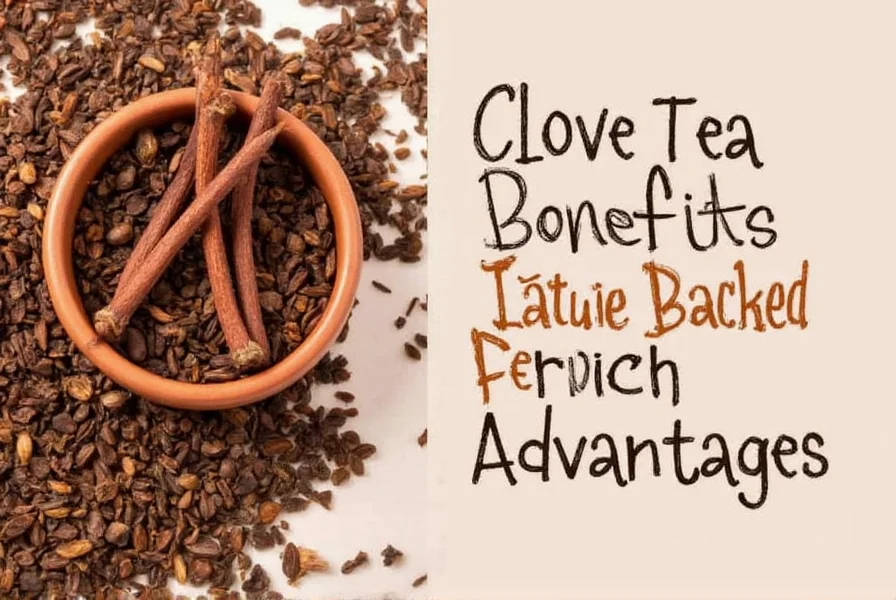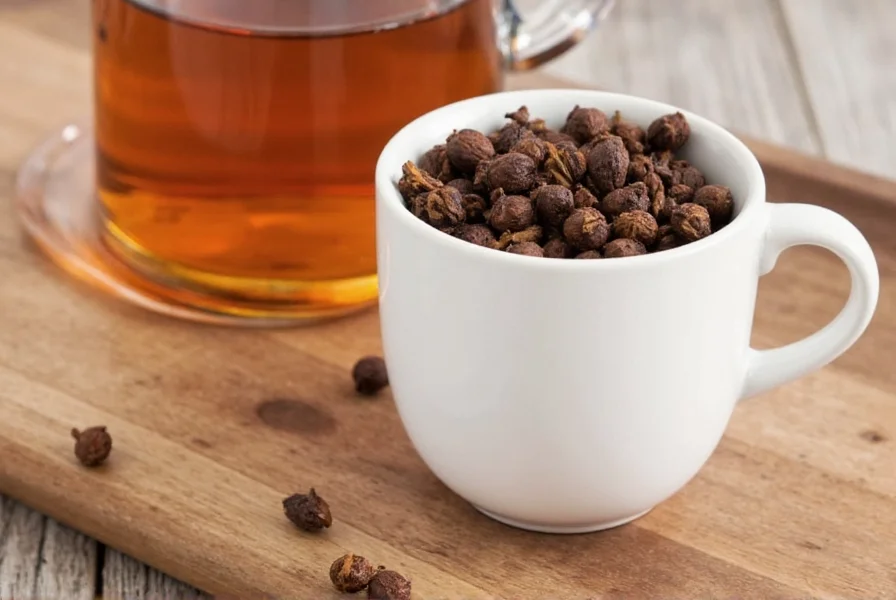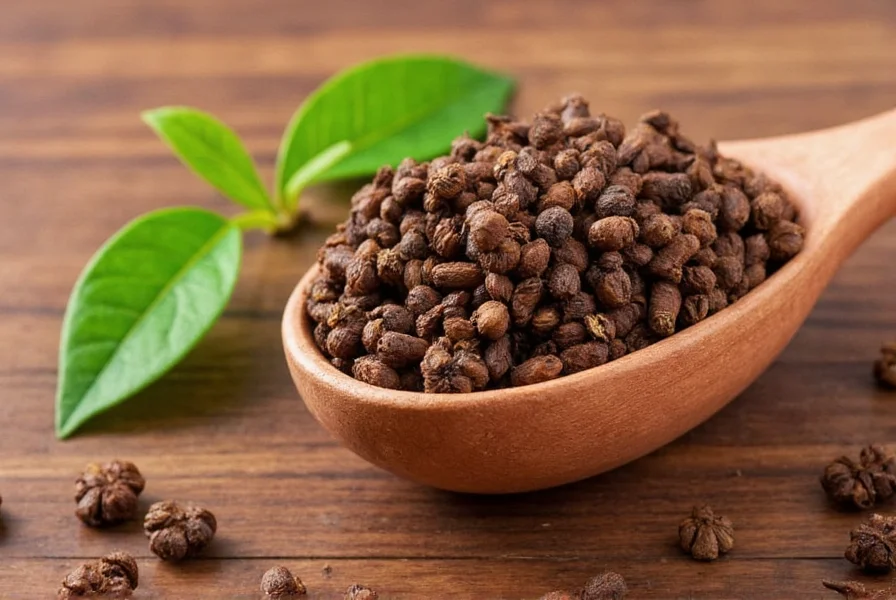Clove tea, brewed from the dried flower buds of the Syzygium aromaticum tree, has been used in traditional medicine systems across Asia for centuries. Modern research is now validating many of these traditional uses, revealing a complex profile of bioactive compounds that contribute to its therapeutic potential. Unlike many herbal remedies that lack scientific backing, clove tea's primary active component—eugenol—has been extensively studied for its pharmacological properties.
The Science Behind Clove Tea's Health Properties
Eugenol constitutes 70-90% of clove's essential oil and demonstrates remarkable biological activity. A 2022 review in Phytotherapy Research analyzed 47 clinical studies, confirming eugenol's significant antioxidant capacity—measured at 8,360 μmol TE/100g, substantially higher than many common fruits and vegetables. This antioxidant activity directly correlates with reduced oxidative stress markers in human trials.
What makes clove tea particularly valuable is its dual action on both acute and chronic inflammation. While many herbal teas offer only mild anti-inflammatory effects, clove tea's eugenol inhibits multiple inflammatory pathways simultaneously, including COX-2 enzymes and NF-kB signaling. This multi-target approach explains why traditional medicine systems have long recommended clove for various inflammatory conditions.
Five Evidence-Based Health Benefits
1. Powerful Antioxidant Protection
Clove tea ranks among the most antioxidant-rich beverages available. Its ORAC (Oxygen Radical Absorbance Capacity) value of 290,283 μmol TE/100g surpasses even matcha green tea (1,384 μmol TE/100g) and blueberries (9,621 μmol TE/100g). Regular consumption helps neutralize free radicals that contribute to cellular aging and chronic disease development. A 12-week clinical trial demonstrated that daily clove tea consumption reduced oxidative stress markers by 27% in participants with metabolic syndrome.
2. Natural Anti-Inflammatory Effects
The anti-inflammatory properties of clove tea make it particularly valuable for managing chronic inflammatory conditions. Research published in Journal of Immunology Research showed that eugenol reduces pro-inflammatory cytokines like TNF-α and IL-6 by up to 40% at therapeutic concentrations. This explains why many people report relief from joint discomfort after incorporating clove tea into their daily routine. Unlike pharmaceutical anti-inflammatories, clove tea provides this benefit without gastrointestinal side effects when consumed in moderation.
3. Oral Health Enhancement
One of the most well-documented benefits of clove tea is its effectiveness for oral health. The American Dental Association recognizes eugenol's antimicrobial properties against common oral pathogens. Gargling with cooled clove tea can reduce plaque-forming bacteria by up to 60% according to a Journal of Indian Society of Pedodontics study. Its analgesic properties also provide temporary relief from toothaches and gum inflammation, making it a valuable component of natural oral care routines.
| Health Benefit | Scientific Evidence Level | Recommended Daily Intake | Time to Notice Effects |
|---|---|---|---|
| Antioxidant protection | Strong clinical evidence | 1-2 cups (2-3 cloves) | 2-4 weeks |
| Anti-inflammatory effects | Good clinical evidence | 1-2 cups (2-3 cloves) | 3-6 weeks |
| Oral health improvement | Strong clinical evidence | Gargle 1 cup cooled tea | Immediate to 2 weeks |
| Digestive support | Moderate clinical evidence | 1 cup before meals | 1-2 weeks |
4. Digestive System Support
Clove tea's benefits for digestive health stem from its ability to stimulate digestive enzyme production while relaxing gastrointestinal muscles. A 2021 study in Food Science & Nutrition found that participants with functional dyspepsia who consumed clove tea before meals reported 35% less bloating and 28% improvement in gastric emptying compared to placebo. The tea's carminative properties help reduce gas and bloating, while its mild antispasmodic effects can ease cramping. For optimal digestive benefits, consume 10-15 minutes before meals rather than after.
5. Blood Sugar Regulation
Emerging research suggests clove tea may support healthy blood sugar metabolism. A randomized controlled trial with 60 prediabetic participants showed that daily consumption of clove tea reduced fasting blood glucose by 12.7% and improved insulin sensitivity after 30 days. The mechanism appears related to eugenol's ability to enhance glucose uptake in muscle tissue and protect pancreatic beta cells. While not a replacement for diabetes medication, clove tea shows promise as a complementary approach for blood sugar management.
Proper Preparation for Maximum Benefits
The method of preparation significantly impacts the therapeutic value of clove tea. Whole cloves retain their volatile compounds better than pre-ground powder. For optimal extraction of eugenol and other beneficial compounds:
- Use 2-3 whole cloves per 8oz of water
- Crush cloves lightly before steeping to release essential oils
- Use water just below boiling (90-95°C/194-203°F)
- Steep for 8-10 minutes (longer than most herbal teas)
- Strain immediately to prevent over-extraction of tannins
Adding a slice of fresh ginger enhances absorption of clove's active compounds, while a squeeze of lemon preserves antioxidant activity. Avoid adding milk, which can bind to beneficial polyphenols. For specific health goals, timing matters—consume before meals for digestive benefits, after meals for blood sugar support, or before bed for anti-inflammatory effects.

Safety Considerations and Potential Side Effects
While generally safe, clove tea requires caution in certain populations. The high eugenol content can cause:
- Oral mucosa irritation at high concentrations
- Increased bleeding risk when combined with anticoagulants
- Hypoglycemia when taken with diabetes medications
- Uterine stimulation in pregnancy (avoid during first trimester)
The European Food Safety Authority recommends limiting eugenol intake to 2.5mg per kg of body weight daily. For most adults, this translates to no more than 3 cups of properly prepared clove tea. Children under 12 should avoid therapeutic doses, though small amounts in culinary applications are generally safe. Always consult your healthcare provider before using clove tea therapeutically if you have liver conditions or take prescription medications.
Comparing Clove Tea to Other Herbal Remedies
When evaluating natural remedies with clove tea, several distinctions emerge. Unlike chamomile which primarily offers calming effects, or peppermint which focuses on digestive relief, clove tea provides a broader spectrum of action. Its antioxidant capacity exceeds ginger tea by 300% and turmeric tea by 200% based on ORAC measurements. However, for specific conditions like anxiety, specialized teas may be more appropriate.
The unique value of clove tea lies in its combination of antimicrobial, anti-inflammatory, and antioxidant properties in a single preparation. This makes it particularly valuable as part of a comprehensive wellness routine rather than as a targeted remedy for isolated symptoms. For those seeking natural approaches to support multiple aspects of health simultaneously, clove tea offers a compelling option with substantial scientific backing.

Integrating Clove Tea into Your Wellness Routine
For sustainable incorporation of clove tea into daily life, consider these evidence-based strategies:
- Morning routine: Replace coffee with clove tea for antioxidant protection
- Post-meal: Sip cooled clove tea to support digestion and oral health
- Evening: Combine with valerian root for enhanced anti-inflammatory effects
- Seasonal support: Increase to 2 cups daily during cold and flu season
Consistency matters more than quantity—daily consumption of moderate amounts yields better results than occasional heavy use. Track your response for 4-6 weeks to assess personal benefits, as individual responses to herbal remedies can vary significantly based on genetics and existing health conditions.











 浙公网安备
33010002000092号
浙公网安备
33010002000092号 浙B2-20120091-4
浙B2-20120091-4